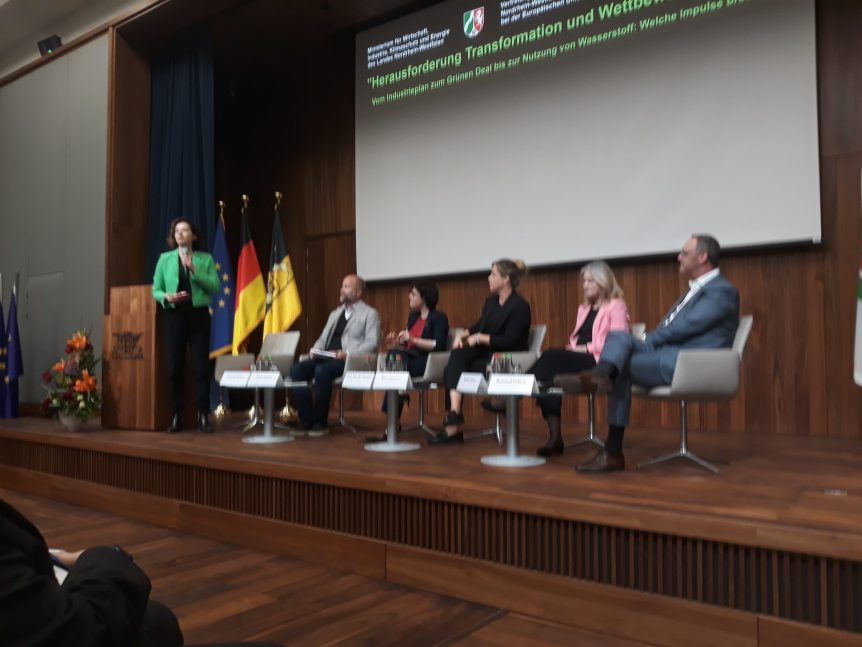
The State Representation of North Rhine-Westphalia in Brussels recently hosted a Belgian-German event that focused on the green energy transformation for the industry in the European context, particularly on the use of hydrogen.
The event was held in the renovated former hall of the Goethe-Institut, which is now part of the representation of Baden-Württemberg.
During the event, Mona Neubaur, NRW Minister for Economic Affairs, Energy and Climate, and Tinne Van der Straaten, Belgian Minister of Energy, both from the Greens, signed an agreement aimed at advancing cooperation between the two countries in this area. In their opening statements, both ministers emphasized how important and urgent it is to drastically reduce CO2 emissions in order to meet the agreed climate targets. They also stressed that democratic states must prove that they are capable of making the necessary decisions, adhering to their own values, and taking the people with them.
Belgium is now Germany’s third-largest gas supplier, providing liquefied natural gas via the Zeebrugge terminal and helping to compensate for the loss of Russian natural gas following the invasion of Ukraine. This has established cooperation between Belgium and Germany in the field of energy policy.
In Zeebrugge, Belgian Prime Minister Alexander De Croo had already described the future use of existing gas pipelines for the transport of green hydrogen as one of the central objectives of Belgian energy policy in the coming years. The Belgium/NRW event followed this and established the connection with the European regulatory framework, which is currently in the legislative process.
The use of hydrogen is elementary for the state of NRW to maintain competitiveness despite the energy transition and remain one of the largest industrial locations in Europe. According to Neubaur, the use of hydrogen is essential for this, and it is elemental for NRW to partner with Belgium in particular. However, there is a lack of much that is necessary for implementation, including skilled workers in industry and trade, and in the administrations for rapid approval procedures. Companies are finding it difficult to make the necessary investment decisions, mainly due to the volatility of energy prices, but also due to ongoing attempts to question the move away from fossil fuels.
Van der Straaten emphasized Belgium’s efforts to expand renewable energies, especially offshore wind energy. The production and transport of hydrogen are also on the right track in Belgium, not least through the import of “green” hydrogen, which is produced in Oman with Belgian help.
The subsequent panel discussion included the participation of the European Commission, the steel company Thyssen, and the Norwegian Bellona Foundation, which is committed to the decarbonisation of industry. Director General Kerstin Jorna pointed out that 24 million companies across the EU have to make decisions about their future business models, and energy plays a central role in this. The adaptation of the EU regulatory framework is in progress to promote the role of hydrogen as an energy carrier.
The event underlined that appropriate infrastructures and cooperation are needed in Europe for European industry to remain competitive in the future. Cooperation between Belgium and Germany has an important role to play in this, and the agreement between the two ministers aimed at concretely advancing cooperation between the two partners in this area is a significant step.